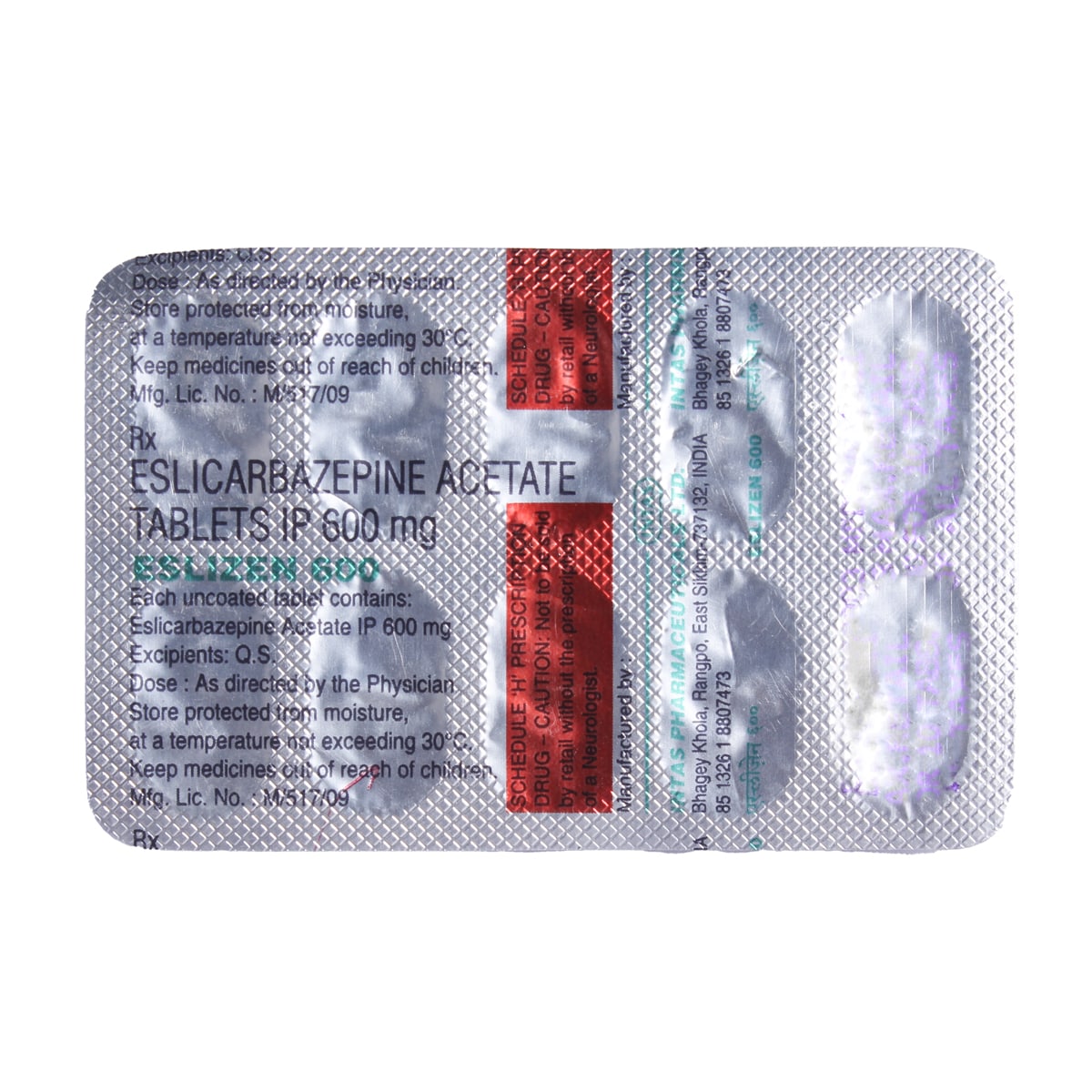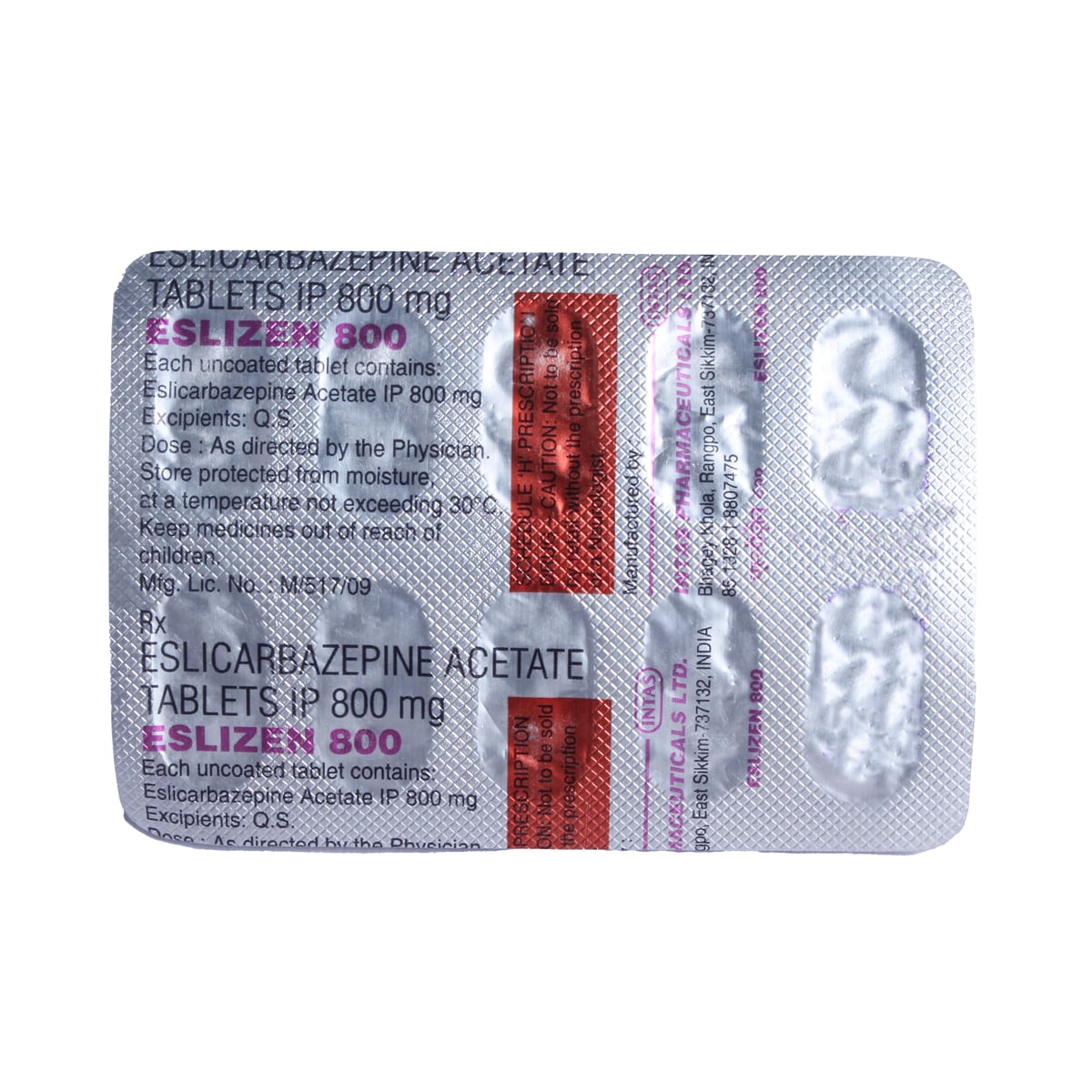Eslicarbazepine Acetate
About Eslicarbazepine Acetate
Eslicarbazepine Acetate belongs to the class of medications called ‘antiepileptic drugs’ used to treat epilepsy (fits). Epilepsy is a sudden rush of electricity in the brain. In epilepsy the brain's electrical rhythms become imbalanced, resulting in recurrent seizures. It can cause changes in your behavior, movements or feelings and levels of consciousness.
Eslicarbazepine Acetate contains ‘Eslicarbazepine acetate’ which is used to treat epilepsy or seizures. It inactivates certain channels in the brain that passes electronic signals. This effect helps to decrease abnormal activity or electrical disturbance in the brain, thereby preventing epilepsy episodes. It reduces the frequency and number of seizure episodes.
You should use this medicine exactly as prescribed by the doctor. Eslicarbazepine Acetate may cause side effects such as dizziness, drowsiness, fatigue and visual disturbances. These side effects usually resolve without requiring treatment. However, if any of these side effects persist or get worse, inform your doctor immediately.
It is not recommended to take Eslicarbazepine Acetate if you are allergic to its contents or other medicines used to treat epilepsy. Before taking Eslicarbazepine Acetate, inform your doctor if you have heart rhythm disorder, heart failure and primary generalized seizures (seizures that involve both sides of the brain). Some people may also experience suicidal thoughts. Seek medical attention immediately in such cases. Eslicarbazepine Acetate should be used with caution in pregnant and breastfeeding women. Eslicarbazepine Acetate is not recommended for children below six years of age, severe liver diseases, and severe kidney diseases. Eslicarbazepine Acetate may require dose adjustments in elderly people. Do not take alcohol while using Eslicarbazepine Acetate as it may increase the risk of side effects. Eslicarbazepine Acetate may cause dizziness or drowsiness, so do not drive or operate heavy machinery if you feel dizzy.
Uses of Eslicarbazepine Acetate
Medicinal Benefits
Eslicarbazepine Acetate contains ‘Eslicarbazepine acetate’ which is used in the treatment of epilepsy or seizures. It acts by decreasing the electrical disturbance in the brain. It can be given as monotherapy in adults who are newly diagnosed with epilepsy. It can also be used in combination with other antiepileptic drugs in children above 6 years and adults to treat partial-onset seizures (seizures that affect one part of the brain).
Directions for Use
Storage
Side Effects of Eslicarbazepine Acetate
- Dizziness
- Drowsiness
- Fatigue
- Visual disturbances
Drug Warnings
Inform your doctor immediately if you notice cognitive disturbances such as confusion, impaired coordination and memory impairment while using Eslicarbazepine Acetate. The doctor may make dose adjustments based on your condition. Inform your doctor if you notice any suicidal thoughts or behaviour. Eslicarbazepine Acetate may cause hyponatremia (decreased sodium levels in the blood) and cause worsening of seizures or decreased consciousness or cognitive disturbances. So, the doctor may advise you to monitor sodium levels while using Eslicarbazepine Acetate. Inform your doctor about all the prescription or non-prescription medicines you are taking as some medicines may increase PR interval. The use of Eslicarbazepine Acetate with these medications can worsen the health condition. If you develop a skin rash, or other skin-related problems while using Eslicarbazepine Acetate, inform your doctor immediately. Please do not stop taking the medication abruptly, as it may increase seizure frequency. So, the doctor gradually decreases the dose before completely stopping the treatment.
Drug Interactions
Drug-Drug Interactions: Eslicarbazepine Acetate may interact with other antiepileptic drugs (phenytoin, carbamazepine, oxcarbazepine), medicines used to lower cholesterol levels (simvastatin and rosuvastatin), oral contraceptives, an antidepressant (amitriptyline) and blood thinner (warfarin).
Drug-Food Interactions: Avoid alcohol consumption while taking Eslicarbazepine Acetate as it may increase dizziness or drowsiness.
Drug-Disease Interactions: Eslicarbazepine Acetate should not be used in patients with heart rhythm disorders, heart failure, severe liver or kidney impairment and primary generalized seizures (seizures that involve both sides of the brain).
Drug-Drug Interactions Checker List:
Safety Advice

Alcohol
unsafeAvoid alcohol consumption as it may increase the risk of side-effects such as dizziness or drowsiness and worsen the condition.

Pregnancy
cautionEslicarbazepine Acetate should be used with caution in pregnant women as it may cause harmful effects to the unborn baby.

Breast Feeding
cautionEslicarbazepine Acetate should be used with caution in breastfeeding mothers as it may cause harmful effects to the nursing baby.

Driving
cautionEslicarbazepine Acetate may cause dizziness or drowsiness, so do not drive or operate heavy machinery if you feel dizzy.

Liver
cautionEslicarbazepine Acetate is probably safe in patients with mild to moderate liver diseases. However, in patients with severe liver diseases, Eslicarbazepine Acetate is contraindicated as this medicine may worsen the health condition.

Kidney
cautionEslicarbazepine Acetate may require dose adjustments when used in patients with kidney diseases. However, in patients with severe kidney impairment, Eslicarbazepine Acetate is contraindicated as this medicine may worsen the health condition.

Children
cautionEslicarbazepine Acetate is not recommended for children below 6 years of age. In children above 6 years, dose adjustment may be required based on body weight.
Habit Forming
Diet & Lifestyle Advise
- A ketogenic diet (low in carbohydrates and high in fats) is recommended for children with epilepsy. This diet helps in utilizing fat instead of glucose for the generation of energy.
- Atkins diet (high fat and controlled carbohydrates) is recommended for adolescents and adults.
- Exercising regularly helps in maintaining weight and improving overall health.
- Rest well, and get plenty of sleep.
- Avoid smoking and alcohol consumption.
- Meditation and yoga can help lower stress, decrease pain sensitivity and improves coping skills.
- Have a seizure response plan, and help those around you know what to do.
- Prepare your living area, small changes may reduce the risk of physical injury during a seizure.
- Understand what triggers seizures and try reducing or avoiding them.
- Please pay attention to overall health as it can help in reducing seizure activity.
- Install an alarm or emergency device to get assistance during a seizure attack.
Special Advise
- Eslicarbazepine Acetate may interact with oral contraceptives. So, women of childbearing potential should use an alternative or effective contraception method throughout the completion of therapy and up to the end of the menstrual cycle after the treatment has stopped.
- Inform your doctor immediately if you become pregnant while taking Eslicarbazepine Acetate.
- Eslicarbazepine Acetate should be used with caution in the elderly as it causes dizziness and increases the risk of falls.
- Your doctor may suggest regular monitoring of electrolytes.
Patients Concern
Disease/Condition Glossary
Epilepsy: It is a brain-related problem in which there is a sudden rush of electricity in the brain. This sudden, uncontrolled disturbance in nerve cells or electrical activity in the brain, results in recurrent seizures (fits), sometimes leading to an unconscious state. In patients with seizures, the typical brain electrical pattern is disrupted by sudden bursts of electrical impulses that affect an individual's consciousness, movements or sensations. Seizures are of two types: generalized and partial seizures. Generalized seizures affect the entire brain, whereas partial seizures affect only a part of the brain. Seizures can cause uncontrollable muscle twitches and spasms. Stronger seizures may cause people to become confused or unconscious. Possible causes include high fever, trauma, genetic disorder, brain injury or stroke.
FAQs
Eslicarbazepine Acetate contains ‘eslicarbazepine acetate’ which is used to treat epilepsy or seizures. It inactivates certain channels in the brain that passes electronic signals. This effect reduces abnormal activity or electrical disturbance in the brain, thereby reducing the number of seizure episodes.
Eslicarbazepine Acetate is possibly safe when used in patients with diabetes. However, it is essential to inform your doctor that you have diabetes before taking Eslicarbazepine Acetate to avoid unwanted effects.
The common side-effects of Eslicarbazepine Acetate are dizziness, drowsiness, fatigue and visual disturbances. These side-effects usually resolve without requiring treatment. However, if any of these side-effects persist or get worse, inform your doctor immediately.
Eslicarbazepine Acetate should not be used in patients with heart rhythm disorders, other heart diseases, heart failure or heart attack, severe liver or kidney diseases and primary generalized seizures (seizures that involve both sides of the brain).
Eslicarbazepine Acetate may alter levels of liver enzymes and electrolyte levels, so inform your doctor that you are taking Eslicarbazepine Acetate before undergoing any laboratory tests.
Eslicarbazepine Acetate may rarely cause change in behavior or depression and increase chance of suicidal thoughts, inform your doctor immediately if you face any of these symptoms.








